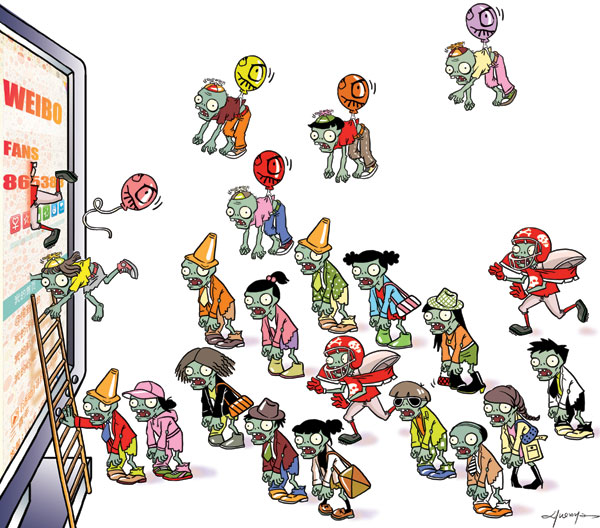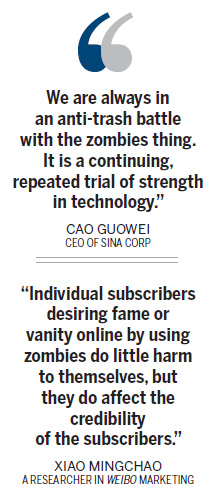Credible figures hard to verify amid hordes of fake followers, Zhang Yuchen reports in Beijing.
 |
With 1,500 fans on her micro blog, Wang Xiaohui feels like a celebrity as she posts photos and records her life, 140 characters at a time. Who cares if her fans are "zombies"?
"More fans following me makes me look popular," said Wang, 22, an office worker in Shanghai. "I don't care whether they are active or not."
"Zombies" are artificial followers that can be bought and sold online for as little as 4 yuan (63 cents) a thousand. They never interact with the people they follow, but they serve the vanity of micro-bloggers like Wang, inflate the accounts of businesses that rely on marketing through social media, and can jeopardize a company's reputation.
They're akin to so-called trolls or the Water Army, hordes of real people who are paid to post comments online to influence public opinion. And both types of illegitimate participants are specialized variations of spam on weibo, the micro-blog site.
Cao Guowei is CEO of Sina Corp, the leading provider of micro-blogging service in China. In a conference call with his staff on Nov 9, he reported that Sina's weibo subscribers had hit 250 million, and that they tweeted more than 75 million messages a day.
"The content of messages spreading on micro blogs relies heavily on the fans' interconnection," said Liu Ruisheng, associate research fellow at the Journalism and Communication Research Institute, Chinese Academy of Social Sciences. "The larger the number of fans there is, the more efficiently the messages spread."
But are those real fans? If not, are the messages really spreading?
In May, an information technology engineer posting on Sina Weibo as Chen Chuanliang Peter said he had developed software to count zombies. He had used his program to survey Sina's 10 most popular micro bloggers and found that on average, about 17 percent of those VIPs' followers never interacted or responded to those they were following. In other words, they were zombies.
Three days later, the survey results were gone from his micro blog. Chen said he had deleted the program.
Choose your model
 |
Depending on how much you want to spend, you can buy one of two types of zombies.
The basic version has no profile photo, no description, fewer than five messages posted and 10-20 followers at most, although it might follow hundreds of others. This zombie is available, only for Sina's Weibo.com, for less than 5 yuan (79 cents) per 1,000 on Taobao, an online marketplace similar to eBay.
The A-level zombie has the characteristics of a real person, with a photo, self-description, tags of categories and its own fans, said Tang Jing, who works for an Internet public relations company.
An individual can buy 5,000 of these zombies for 120 yuan. The software that creates them can produce 2,000 a day.
"A zombie can automatically generate about 100-500 fans of its own," Tang said, "though these zombies with their own fans will never be active. They just look so real."
A Beijing saleswoman for the company Weibo.pk, which produces zombies, said the company cannot guarantee the future stability of fans or followers as Sina Corp updates its platform.
"We are always in an anti-trash battle with the zombies thing," Sina chief Cao said Nov 5 in an interview on Yang Lan One on One, a TV talk show. "So far, we have banned tens of millions of accounts that are not active or produce only junk.
"It is a continuing, repeated trial of strength in technology."
Who is hurt?
"Individual subscribers desiring fame or vanity online by using zombies do little harm to themselves," senior researcher little Mingchao said, "but they do affect the credibility of the subscribers." Xiao studies weibo marketing for Sinomonitor International, a Beijing-based new media analysis organization.
Chen Yang, a well-known TV host in Guangzhou, Guangdong province, closed his weibo account last November, saying he could not endure the faked popularity caused by the zombies following him.
"Refusing to tolerate the zombies would be natural for those who care about true communication with real people," Xiao said. "At least, people's online communication with others serves as an extension of their social life."
Meanwhile, companies that use micro blogs to market their products or brands may suffer at the hands of zombies or the Water Army.
Haomen Jipin Abalone Restaurant in Shuozhou, in North China's Shanxi province, announced a promotion in cooperation with chinamil.com.cn, a website sponsored by PLA Daily of the Chinese People's Liberation Army. In an ad posted online in late September, the restaurant said: Tell us your feelings about seeing the launch of the spacecraft Tiangong-1.
The ad said that whoever forwarded the message the most could win an iPad or iPhone. The contest would end by Oct 7.
Subsequent inquiries indicate that members of the Water Army, eager to try for the prize, enlisted spam software to run up the numbers. By Oct 7, the ad had been reposted or forwarded on Sina Weibo 13 million times, setting a Chinese record.
On Oct 15, the restaurant announced that the huge numbers clearly were the result of reposting by phony accounts. It canceled the contest. In lieu of the prize, the restaurant said, it would donate an equivalent amount, 31,500 yuan, to a charitable project that provides free lunches to poor children.
Sina looked into the so-called reposting record a few days later. It said that 150,000 weibo users had directly forwarded the messages, but only 3,000 were subscribers with real profiles. And the message was actually posted and reposted only 9,000 times, not 13 million. Sina said it banned the suspect accounts.
Evaluating value
"The faked prosperity destroyed the credibility of the business," said Xiao, the weibo marketing researcher. "This leaves little room for the company that would like to accurately evaluate its brand's value.
"Besides," he said, "it leaves the micro blog undervalued in the marketing process."
Some subscribers - those with huge fan bases - can earn money by posting or forwarding an advertising message. Chinese media reports say that an online PR company might pay 400-500 yuan to an account followed by more than 2 million fans.
Fan activity determines the true quality of a subscriber, as well as the effects of micro blog marketing, according to a basic marketing analysis by AdMaster Digital Consulting Co in Shanghai.
"As an open platform for connection building," Xiao said, "the micro blog can only develop in a healthy way on true popularity. When people drop their goal of drawing attention or being famous, zombies and the online Water Army won't be a topic anymore."
